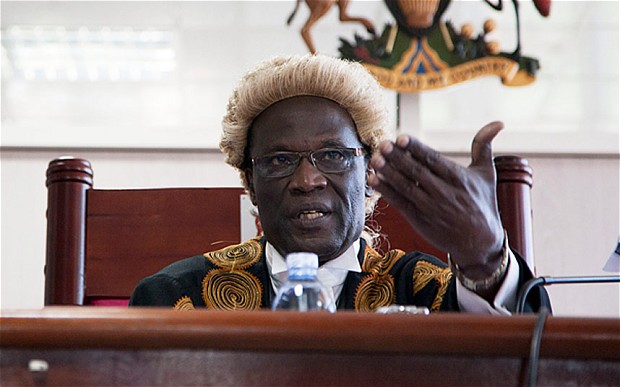Breaking News
- Flexible Remote Work Opportunity for University Students: Earn $100–$250 Per Month ...Read More
- Ministry of Education and Sports Azerbaijan Government Scholarships For 2025-2026 Academic Year ...Read More
- Government Sponsorship Undergraduate Admission Lists 2025-26 for Makerere University ...Read More
- Ministry of Education And Sports: Egyptian Government Scholarships 2025-2026 Academic Year ...Read More
- Ground Breaker Full Scholarship for girls to study Software Engineering 2025 July Intake ...Read More
- Tony Elumelu Foundation Entrepreneurship Programme (TEEP) 2025 for young African Entrepreneurs ...Read More
- DESIGNING FUTURES 2050 International Design Competition 2025 (€15,000 prize) ...Read More
- Ground Breaker Full time Scholarship for girls to study Software Engineering 2025 Intake ...Read More
- Ministry of Education And Sports Algerian Vocational Training Scholarships for 2024-2025 AY ...Read More
- Ministry of Education and Sports Advert for the Algerian Government Scholarships for 2024-2025 ...Read More
Judge and Magistrate
Arbitrate, advise, adjudicate, or administer justice in a court of law. May sentence defendant in criminal cases according to government statutes or sentencing guidelines. May determine liability of defendant in civil cases.
Add to FavouritesTasks
1. Read documents on pleadings and motions to ascertain facts and issues.
2. Rule on admissibility of evidence and methods of conducting testimony.
3. Instruct juries on applicable laws, direct juries to deduce the facts from the evidence presented, and hear their verdicts.
4. Award compensation for damages to litigants in civil cases in relation to findings by juries or by the court.
5. Monitor proceedings to ensure that all applicable rules and procedures are followed.
6. Preside over hearings and listen to allegations made by plaintiffs to determine whether the evidence supports the charges.
7. Research legal issues and write opinions on the issues.
8. Write decisions on cases.
9. Advise attorneys, juries, litigants, and court personnel regarding conduct, issues, and proceedings.
10. Interpret and enforce rules of procedure or establish new rules in situations where there are no procedures already established by law.
11. Settle disputes between opposing attorneys.
12. Impose restrictions upon parties in civil cases until trials can be held.
13. Provide information regarding the judicial system or other legal issues through the media and public speeches.
14. Rule on custody and access disputes, and enforce court orders regarding custody and support of children.
15. Sentence defendants in criminal cases, on conviction by jury, according to applicable government statutes.
16. Grant divorces and divide assets between spouses.
17. Participate in judicial tribunals to help resolve disputes.
18. Conduct preliminary hearings to decide issues such as whether there is reasonable and probable cause to hold defendants in felony cases.
19. Supervise other judges, court officers, and the court's administrative staff.
Key knowledge areas
1. Law and Government — Knowledge of laws, legal codes, court procedures, precedents, government regulations, executive orders, agency rules, and the democratic political process.
2. English Language — Knowledge of the structure and content of the English language including the meaning and spelling of words, rules of composition, and grammar.
3. Public Safety and Security — Knowledge of relevant equipment, policies, procedures, and strategies to promote effective local, state, or national security operations for the protection of people, data, property, and institutions.
4. Psychology — Knowledge of human behavior and performance; individual differences in ability, personality, and interests; learning and motivation; psychological research methods; and the assessment and treatment of behavioral and affective disorders.
5. Administration and Management — Knowledge of business and management principles involved in strategic planning, resource allocation, human resources modeling, leadership technique, production methods, and coordination of people and resources.
6. Customer and Personal Service — Knowledge of principles and processes for providing customer and personal services. This includes customer needs assessment, meeting quality standards for services, and evaluation of customer satisfaction.
7. Sociology and Anthropology — Knowledge of group behavior and dynamics, societal trends and influences, human migrations, ethnicity, cultures and their history and origins.
Skills
1. Active Listening — Giving full attention to what other people are saying, taking time to understand the points being made, asking questions as appropriate, and not interrupting at inappropriate times.
2. Critical Thinking — Using logic and reasoning to identify the strengths and weaknesses of alternative solutions, conclusions or approaches to problems.
3. Judgment and Decision Making — Considering the relative costs and benefits of potential actions to choose the most appropriate one.
4. Complex Problem Solving — Identifying complex problems and reviewing related information to develop and evaluate options and implement solutions.
5. Reading Comprehension — Understanding written sentences and paragraphs in work related documents.
6. Speaking — Talking to others to convey information effectively.
7. Active Learning — Understanding the implications of new information for both current and future problem-solving and decision-making.
8. Writing — Communicating effectively in writing as appropriate for the needs of the audience.
9. Monitoring — Monitoring/Assessing performance of yourself, other individuals, or organizations to make improvements or take corrective action.
10. Social Perceptiveness — Being aware of others' reactions and understanding why they react as they do.
11. Negotiation — Bringing others together and trying to reconcile differences.
12. Instructing — Teaching others how to do something.
13. Persuasion — Persuading others to change their minds or behavior.
14. Systems Analysis — Determining how a system should work and how changes in conditions, operations, and the environment will affect outcomes.
15. Time Management — Managing one's own time and the time of others.
16. Coordination — Adjusting actions in relation to others' actions.
17. Learning Strategies — Selecting and using training/instructional methods and procedures appropriate for the situation when learning or teaching new things.






































































































